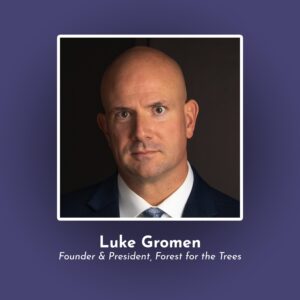
Show Summary
On this episode, financial analyst Luke Gromen joins Nate to discuss how the availability of cheap energy has underpinned our current financial architecture and expectations – and what peak cheap oil implies for the future. A central part of this story is the rise of the US dollar as a global reserve currency tightly linked with the ability to purchase oil – subsequently leading to the US becoming a major exporter of debt. How have countries with economies based on natural resources and manufacturing differed in their response to geopolitical uncertainty in comparison to those who are based around finance and the service industry? What might the response be from countries holding US debt in anticipation of a declining oil supply? What does this mean for the future of global currencies in a simplified global economy and a finance system that will eventually need to be re-tethered to the finite nature of Earth?
About Luke Gromen
Luke Gromen is the Founder and President of research firm Forest For The Trees, LLC, whose goal is to aggregate a wide variety of macroeconomic, thematic and sector trends in an unconventional manner to identify investable developing economic bottlenecks for clients. Luke founded FFTT to apply what clients and former colleagues consistently described as a “unique ability to connect the dots” during a time when he saw an increasing “silo-ing” of perspectives occurring on Wall Street and in corporate America. Luke has 25 years of experience in equity research, equity research sales, and as a macro/thematic analyst. He holds a BBA in Finance and Accounting from the University of Cincinnati and received his MBA from Case Western Reserve University. He earned the CFA designation in 2003.
In French, we have a motto that says that a simple drawing is often better than a long explanation. Jean-Marc Jancovici Carbone 4 President
That’s very understandable because with left atmosphere thinking, one of the problems is that you see everything as a series of problems that must have solutions. Iain McGilchrist Neuroscientist and Philosopher
We can’t have hundreds and hundreds of real relationships that are healthy because that requires time and effort and full attention and awareness of being in real relationship and conversation with the other human. Nate Hagens Director of ISEOF
This is the crux of the whole problem. Individual parts of nature are more valuable than the biocomplexity of nature. Thomas Crowther Founder Restor
Show Notes & Links to Learn More
Download transcript00:15 – Luke Gromen info, Forest for the Trees LLC
03:10 – Energy Backed US Dollar
03:25 – Nixon taking the US off the gold system
03:58 – Jelle Zijlstra
05:35 – 90% of oil production growth has come from US Shale
05:52 – 8-10% growth in the price of oil is needed in order to break even in shale oil fields
06:21 – Red Queen Phenomenon
13:20 – China 27-year gas deal with Qatar
13:32 – How China came to control an OPEC country’s oil
14:38 – China selling off US Treasuries
15:15 – US freezing Russia’s assets
16:03 – Dutch Disease
18:37 – Energy is the currency of life
18:49 – Work hours in a barrel of oil (Section 4.3)
19:27 – Breakdown of US and Russian GDPs
23:55 – BRICS, new BRICS members
25:05 – China is the biggest oil importer and the biggest trading partner with most of the world
27:09 – Straits of Malacca
29:14 – Alan Greenspan
31:07 – Mutually assured destruction
32:32 – The US is 90% energy independent
34:05 – Dollar denominated debt
36:27 – US debt up 11-12 trillion dollars in the last decade
36:41 – Money comes from commercial bank loans and government deficit spending
38:17 – US spending is 65% on entitlements, 25% on defense, and 30% on interest
39:26 – Quantitative Easing and Yield Curve Control
40:51 – 1999 emerging markets crisis
42:30 – Ghana buying energy using gold, Argentina using Yuan swaps to repay the IMF
45:35 – Expansion of paper gold derivatives over the last 30-40 years
48:20 – Stock to flow ratio
50:02 – US restriction on gold in the 1930s, limits on cryptocurrency today
50:28 – US has a quarter of world’s gold reserves
52:38 – US’s largest export is US treasuries
56:30 – Bank of Japan yield curve control
57:18 – WWII US cap of treasury bonds and consequential value in real vs nominal rates
1:01:24 – Debt Jubilee
1:02:32 – US blue states currently subsidize the red states
1:08:46 – Authoritarian states make change more quickly and allocate resources more easily than democracies
1:11:15 – Helen Thompson – Disorder
1:12:34 – Strategic Petroleum Reserves
1:16:58 – Tragedy of the Commons
1:21:25 – Dan Oliver chart showing hyperinflation in Weimar Germany
1:22:40 – 2-year treasury volatility March 2023, repo-rates spike from 2% to 10%
1:29:23 – Care economy






